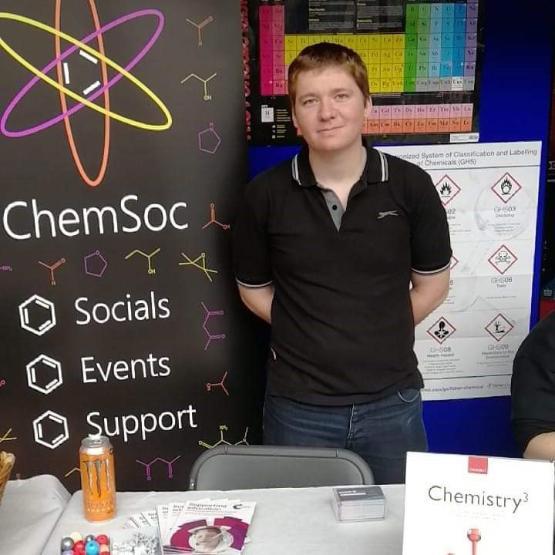Daniel
PhD in Computational Biophysical Chemistry
- Studied chemistry with an integrated Master's degree here at Bradford.
- Is a member of the ChemSoc chemistry society.

My PhD
"Since graduating from my undergraduate course, I have enrolled onto a PhD in chemistry, more specifically a PhD on computational biophysical chemistry. I will be working with my PhD supervisor on anticancer chemistry.
"The aim of my PhD is to study the Sp transcription family of proteins. A specific family member is a protein called Sp1 which can bind to DNA to regulate lots of tasks to do with the cell cycle. This protein is overexpressed in certain types of cancers. Therefore, I am using computational methods to study how small molecules such as NDGA can competitively or noncompetitively inhibit the binding of Sp1 to DNA.
"On a day to day basis, I am not your typical chemistry graduate working in a lab, with the white lab coat on. I sit at my computer and visualise biomolecules such as proteins and DNA as they interact with one another and see how they move as a function of time and under different conditions."
Preparing me
"The integrated Master’s part of the undergraduate degree is what really helped and prepared me for life as a PhD student at the University of Bradford.
"The Master’s modules taught me to work and think as an independent researcher, but support was given by the supervisors if I was stuck on a certain problem.
"As a chemistry graduate, you are actively taught how to critique published work, how to problem-solve and how to analyse data, as well as other skills such as project management and teamwork. I use all of these skills and techniques on a daily basis to help me complete my PhD."
My advice would be to keep your options as broad as possible if you do not have a passion for a given subject area. The beauty of chemistry is that, if you do not enjoy the subject, you will have been taught so many different skills you can pick and choose any career path from medicine to law, and everything in between.
My favourite thing
"I have enjoyed all of what chemistry has had to offer me, but if I was to choose one thing it would be the computational and theoretical aspect of the subject. It would be pretty strange if I did not enjoy this the most, given I am doing a PhD in this area!
"What I enjoy the most about this area, is how experimental data and theoretical insight techniques overlap to give the computational programmes that I use on a daily basis. I also enjoy visualising proteins in atomic-level detail, something which cannot be fully appreciated using experimental methods."
Passion for study
"I have always wanted to study for a PhD. I have always been inspired by academics as they love what they do, and pass that enthusiasm on to the students, through their teaching and research.
"But if you had told me during my A-levels that I would be studying for a biological related PhD, I would have not believed you, as biology was never my strong subject. But given the truly multidisciplinary subject which is chemistry I have come to learn to love the biological aspect of chemistry."
Future goals
"My goals for the future are to contain my academic trajectory and to not leave education. I will fulfil this in the form of post-doctoral work, where in the world I am not entirely sure yet, but hopefully somewhere close to home.
"My experiences at Bradford will help me achieve these goals because of the immense amount of support available here at the University. Whether its support from careers, supervisor teams, subject librarians and much, much more."
